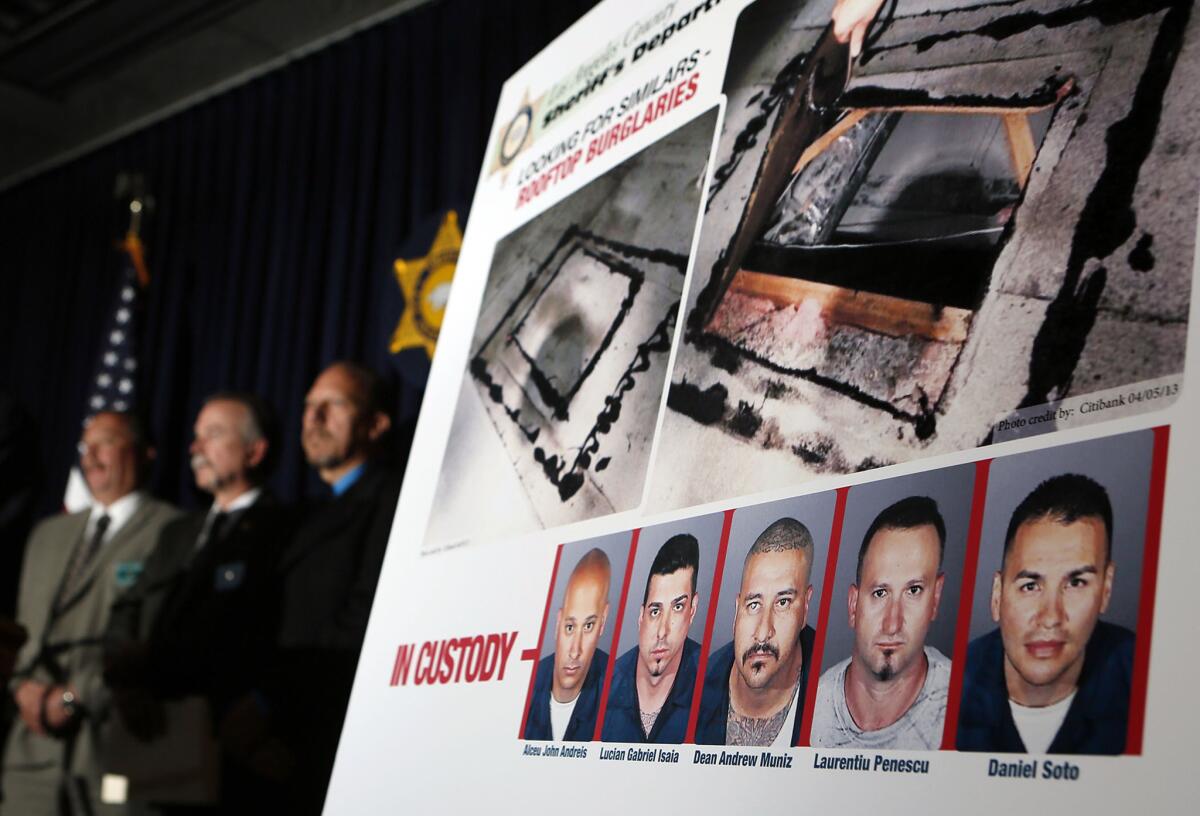Great Read: Tracking burglars living the high life off rooftop bank heists

The men had their pick of eight banks at the busy intersection of Diamond Bar Boulevard and Grand Avenue. They chose the Citibank branch that used to be a Blockbuster store.
For more than a month, the five of them became regular customers. But unlike others who used that branch, they returned after dark — to watch and wait.
Then, one night last April, four of the men climbed out of a white van in matching Dickies jeans and long-sleeved shirts. Even their shoes matched: size 101/2 wide DieHard work boots, although one of the men was much smaller than the rest.
Carrying a 6-foot ladder, roofing materials, a drill and other heavy equipment, they climbed onto the Diamond Bar bank’s roof. For three hours, they cut and sliced through the rooftop. Using a sonar device, they were able to locate the vault and cut a hatch right over it.
They stole nothing that night — in fact, they sealed the hole up before leaving. This was a two-night job, and they wanted to make sure bank employees never suspected a thing.
Outside the Citibank that night, the crew’s lookout sat in another car drinking a 16-ounce Rockstar energy drink, a walkie-talkie in his hand.
But he wasn’t the only one watching.
::
Bank robbers always have used pretty much the same modus operandi: in through the front door, armed. These thieves were different. They didn’t use threats or guns — just their drilling equipment.
Since a gang broke through the reinforced roof of a Laguna Niguel bank and blew a hole in the safe nearly four decades ago, it’s been extremely rare in Southern California for thieves to bust in from above to steal millions.
But this new crew was taking advantage of less-fortified one-story strip-mall banks with cuttable roofs and more easily breached after-market concrete vaults, investigators say. Although those banks don’t keep a lot of their cash in the vaults, some of their customers do, particularly in the wealthy, heavily Asian suburbs of the San Gabriel and Pomona valleys.
“This type of crime is a real rarity,” said William J. Rehder, a retired FBI agent and author of “Where the Money Is: True Tales from the Bank Robbery Capital of the World.”
Rehder, who spent decades with the FBI’s L.A. bank robbery squad, said the rooftop bank jobs require real skill. “They got some real big takes in these burglaries,” he said. “They chose banks in strip malls, and the setting makes it all the more easy.”
When employees at the East West Bank in Rowland Heights opened the vault on a Monday morning in August 2011, the air was filled with gray dust, and 65 safe-deposit boxes lay scattered on the floor. A million dollars in bank cash was gone. The safe-deposit boxes, which once held as much as $14 million in cash, gold and jewelry, were empty.
The thieves left only one clue: the 2-by-3 holes they had cut in the ceiling before carefully replacing the roof material so anyone seeing the bank from the air wouldn’t suspect it been compromised.
“There aren’t too many rooftop heist serial crews this sophisticated,” said Det. Nicholas Cannis of the L.A. County Sheriff’s Major Crimes Bureau. “We knew this wasn’t first time they cut into a building to do a burglary.”
The Preferred Bank a few miles away in a Diamond Bar strip mall was hit four months later. Though the thieves never got into the vault, the M.O. was identical. Detectives believe they found the vault too difficult to breach and abandoned the job.
Then, on Sept. 8, 2012, thieves broke into the vault of the BBCN Bank on Diamond Bar Boulevard. Once inside, they stole $430,000 in bank cash and pried open 60 safety deposit boxes for $2 million more in cash, jewels and property, insurance claims indicate.
Cannis and his partner, Det. Randall Rue-Las, joined the hunt and began to scour the casebooks for thieves who had sliced through Southern California rooftops to the businesses below.
And this time, the bank burglars had left a clue: the plastic back of a walkie-talkie amid the dust. Sheriff’s forensic specialists lifted some DNA off the surface and entered it in the state database.
Bingo.
::
The DNA belonged to a Fontana man, Dean “Dino” Muniz, who had done time for drug possession and grand theft. Muniz didn’t have the criminal pedigree for the rooftop heists. But investigators tracking him soon discovered that three of his friends did.
With their Marine-style close-cut hair, muscles bulging from beneath their T-shirts, Lucian Gabriel Isaia, Alceu Johnny Andreis and Laurentiu Penescu could be a support cast for action actor Vin Diesel.
Although they lived in modest homes in the Inland Empire towns of Beaumont, Banning and Yucaipa, their lifestyles were anything but modest: fast cars, a fleet of Ducatis, bottles of 1950s-vintage Dom Perignon, and trips to Las Vegas where they’d drop $60,000 in gambling sprees, according to court documents and prosecutors.
The 33-year-old Isaia’s speedboat boasted a name that said it all: Early Retirement.
“None of them worked and they were living the high life. They had all the toys,” Cannis said. “They spent most of their time spending money. The problem was, it wasn’t their money but other people’s money.... They simply believed they were characters in ‘Ocean’s Eleven’ or ‘Fast and Furious.’”
Nearly a decade ago, the trio had been imprisoned for a series of Riverside County rooftop heists. In those cases, a nine-member crime gang stole more than $3.5 million in cash and gems from jewelers in Palm Springs and Temecula, as well as other businesses, according to prosecutors and court records.
Doing time for those capers, the trio came into contact with two new cohorts, prosecutors said: convicted identity thief Daniel Soto, 37 — and Muniz, 46.
::
On the desert roads and towns of the Inland Empire, detectives began a dogged game of surveillance, tailing the suspects’ luxury sedans and vintage cars in beat-up undercover cars.
Some days were family days for the men. On others, they pursued their hobbies: Detectives trailed Muniz, a lover of old cars, to the Pomona Swap Meet, where he would spend hours gathering up vintage pieces, Cannis said.
Cannis said they’d often head for the casinos in the Inland Empire, including San Manuel Indian Bingo & Casino. “Sometimes we followed them inside and see who they met up with,” Cannis said. The stocky Penescu, 39, had a particular fondness for high-stakes poker, Cannis said.
L.A. County Sheriff’s Lt. Kent Wegener said it was a round-the-clock operation.
“Our guys got a lot of late night call-outs, false alarms,” Wegener said. “Sometimes the suspects were just going out to have fun. They kept some late nights.”
Finally, in February 2013, undercover detectives saw Andreis, 46, and Muniz pull up near the Citibank branch in Diamond Bar. In the weeks that followed, they walked around the bank, identifying security cameras and checking the hours of businesses. They analyzed potential escape routes to the local freeways, Cannis said.
More than a few times the men were seen loading equipment into a vehicle and heading to the bank. Each time, a large crew of detectives and tactical deputies would shadow them, but time and time again nothing happened.
Finally, on the night of April 4, Andreis, Muniz, Soto and Isaia loaded up the van with their construction tools and set out for the bank, they later acknowledged in court records. Penescu followed in another car, documents show.
From a neighboring property, Cannis and other veteran detectives could see the rooftop activity.
It was nearly 2 a.m. when the five men drove off from the bank. They didn’t get far — a GPS device had been attached to the van. As they drove eastbound on the 60 Freeway, the road emptied of cars. Some 30 detectives and deputies stopped the van and the lookout car and handcuffed the men without a struggle.
In late January, Muniz pleaded guilty to bank burglary, admitted conspiring with the others and being involved in the BBCN and Citibank heists and acknowledged he committed the crimes with the four other men. As part of the plea, in which he agreed to be sentenced to up to 10 years in federal prison, he acknowledged details of the BBCN and Citibank crimes.
Two days later, Andreis, Penescu and Isaia, handcuffed and shackled, shuffled into a downtown L.A. courtroom. Without a deal with prosecutors, they pleaded guilty to conspiracy to commit bank burglary and attempted bank burglary, Assistant U.S. Atty. Justin R. Rhoades said. Each faces up to 25 years in prison at sentencing this summer.
Soto, charged with the final attempted burglary, has been cooperating with federal prosecutors, according to several sources, who requested anonymity because they were not authorized to discuss the case.
Isaia’s attorney, Nic Cocis, who has previously represented some of the men in court, said his client along with Penescu and Andreis had been convicted only in the Citibank attempted bank burglary and the conspiracy connected to it.
“These crimes occurred in the middle of night. None of the crimes involved violence. No weapons were ever used,” he said. “These are family men.”
Prosecutors are preparing to charge the men in at least two of the other bank burglaries.
And there’s something else, Cannis said: “All that money is still somewhere out there.”
More to Read
Sign up for Essential California
The most important California stories and recommendations in your inbox every morning.
You may occasionally receive promotional content from the Los Angeles Times.











